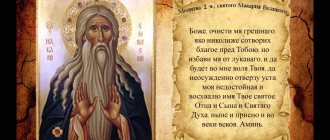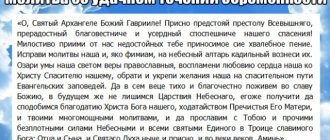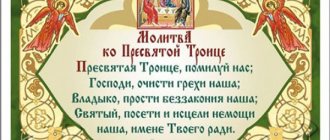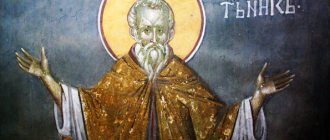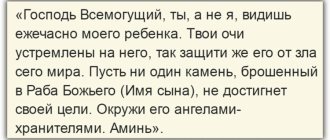Prayers for the departed
The rite of litia performed by a layman at home and in the cemetery
Through the prayers of the saints, our fathers, Lord Jesus Christ our God, have mercy on us. Amen.
Glory to Thee, our God, glory to Thee.
Heavenly King, Comforter, Soul of truth, Who is everywhere and fulfills everything, Treasure of good things and Giver of life, come and dwell in us, and cleanse us from all filth, and save, O Good One, our souls.
Holy God, Holy Mighty, Holy Immortal, have mercy on us. (Read three times, with the sign of the cross and bow from the waist.)
Glory to the Father and the Son and the Holy Spirit, now and ever and unto ages of ages. Amen.
Prayer to the Most Holy Trinity
Most Holy Trinity, have mercy on us; Lord, cleanse our sins; Master, forgive our iniquities; Holy One, visit and heal our infirmities, for Thy name's sake. Lord have mercy. (Thrice)
Glory to the Father and the Son and the Holy Spirit, now and ever and unto ages of ages. Amen.
Our Father, who art in heaven! Hallowed be Thy name, Thy kingdom come, Thy will be done, as it is in heaven and on earth. Give us this day our daily bread; and forgive us our debts, just as we forgive our debtors; and do not lead us into temptation, but deliver us from the evil one.
Lord have mercy (12 times)
.
Come, let us worship our King God. (
Bow)
Come, let us bow and fall down to Christ, our King God. (
Bow)
Come, let us bow and fall down to Christ Himself, the King and our God. (Bow)
Living in the help of the Most High, he will settle in the shelter of the Heavenly God. Says the Lord: Thou art my intercessor, and my refuge, my God, and I trust in Him. Yako Toy will deliver you from the snare of the trap and from rebellious words. His cloak will overshadow you, and you will trust under His wing. His truth will surround you with a weapon, you will not be afraid from the fear of the night, from the arrow flying in the days, from the thing that passes in darkness, from the cloak and demon of the midday. Thousands will fall from your country, and the place at your right hand will not come close to you. Look before your eyes, and you will see the reward of sinners. For You, O Lord, are my hope, You have made the Most High your refuge. Evil will not come to you, and wound will not come close to your body. As His angel commanded you, keep you in all your ways. They will lift you up in their arms, but not when you dash your foot against a stone. Tread on the asp and the basilisk, and cross the lion and the serpent. For I have trusted in Me, and I will deliver; I will cover and because I have known My name. He will call to Me, and I will hear him; I am with him in sorrow, I will destroy him, and I will glorify him; I will fill him with long days, and show him My salvation.
Glory to the Father and the Son and the Holy Spirit, now and ever and unto ages of ages. Amen. Alleluia, alleluia, alleluia, glory to Thee, O God (
Three times).
Troparion, tone 4
With the spirits of the righteous who have passed away, the soul of Thy servant (Thy servant), O Savior, give rest, preserving and (u) in the blessed life that is Yours, love for mankind.
In Thy chamber, O Lord, where all Thy saints rest, rest also the soul of Thy servant, for Thou art the only Lover of mankind.
Glory to the Father and the Son and the Holy Spirit.
Thou art God, who descended into hell, and loosed the bonds of the bound, and give rest to Thy servant Himself and the soul.
And now and ever and unto ages of ages.
One pure and immaculate Virgin, who gave birth to God without a seed, pray to his (her) soul to be saved.
Sedalen, voice 5th
Peace, our Savior, with the righteous of Thy servant (Thy servant), and this (this) has settled in Thy courts, as it is written, despising, as Good, his (her) sins, voluntary and involuntary, and all that is in the knowledge and not knowledge, Humane.
With the saints, rest, O Christ, the soul of Thy servant (Thy servant), where there is no sickness, no sorrow, no sighing, but endless life.
Thou art the One Immortal One, who created and created man, on earth we were created from the earth, and to the other earth we will go, as Thou Who Created me commanded, and to me: as Thou art the earth, and thou art gone to the earth, and even all men may go, creating funeral lamentations song: alleluia, alleluia, alleluia.
We magnify You, the most honorable Cherub and the most glorious without comparison Seraphim, who gave birth to God the Word without corruption.
Glory to the Father and the Son and the Holy Spirit, now and ever and unto ages of ages. Amen.
Lord have mercy (three times)
bless.
Through the prayers of the saints, our fathers, Lord Jesus Christ, Son of God, have mercy on us.
In the blessed dormition, grant eternal rest, O Lord, to Thy departed servant (Thy departed servant) (name),
and create for him (her) an eternal memory.
Eternal memory (
three times).
His (her) soul will be established in good things, and his (her) memory for generations and generations.
From the book “Complete Orthodox Prayer Book for the Laity”
2nd ed., Spanish
and additional M.: Sretensky Monastery; "A new book"; “Ark” , 1998.
Prayer for the repose of the soul of the newly departed (deceased) - father, mother, grandmother, grandfather. Text, how, when and what prayer to read correctly. Video “Rest with the Saints!”
Patriarch of Moscow and All Russia Kirill on why we need to pray for the dead (timing: one and a half minutes)
Prayer for the repose of all the departed
Rest in peace, O Lord, the souls of Your departed servants: Your most holy patriarchs, most Reverend metropolitans, archbishops and bishops, who served You in the priesthood, church and monastic ranks; the creators of this holy temple, the Orthodox forefathers, fathers, brothers and sisters, lying here and everywhere; leaders and warriors who laid down their lives for faith and fatherland; the faithful, killed in internecine warfare, drowned, burned, frozen to death, torn to pieces by beasts, suddenly died without repentance and did not have time to reconcile with their enemies; those for whom they commanded and asked us to pray, for whom there is no one to pray, and the faithful, deprived of Christian burial - in a brighter place, in a greener place, in a place of peace, from where sickness, sadness and sighing have escaped. And, as you are good and a lover of mankind, forgive all their voluntary and involuntary sins and deliver them eternal torment, as there is no man who will live and not sin, but You are the only one besides sin, Your truth is truth forever, and You are the only God mercy and generosity and love for mankind, and we send glory to You, Father and Son and Holy Spirit, now and ever and unto ages of ages. Amen.
Prayer "God of spirits and all flesh..."
“God of spirits and all flesh, having trampled down death and abolished the devil, and given life to Thy world: O Lord, rest the soul of Thy departed servant [or Thy departed servant] named, in a bright place, in a green place, in a place of peace, from nowhere. illness, sadness and sighing. Every sin committed by him [or she] in word, or deed, or thought, as God is a good lover of mankind, forgive, as if a person does not live and will not sin. For You are One besides sin, Your righteousness is righteousness forever, and Your word is truth.” (Sequence of the funeral service for the laity.)
(In Russian: “God of spirits and all flesh, who conquered death, destroyed the power of the devil and gave life to Your world, Himself, Lord, rest the souls of Your departed servants (names) in a place of light, bliss, peace, where there is no torment, sorrow and mental suffering. As a good and humane God, forgive them every sin committed by them in word, or deed, or thought; because there is no person who would spend earthly life without sin - You alone are without sin; Your justice is eternal justice, and Your word is truth."
I mean a prayer (and we will talk about it in detail), which is repeated several times during the funeral service (and in all memorial services), repeated at the end of each litany. This is the prayer “God of spirits and all flesh, having trampled down death and abolished the devil, and given life to Thy world,” the end of which is a doxology, ekphonesis of the litany: “For Thou art the resurrection and life and rest of Thy fallen servant, O Christ our God...”. This prayer (more precisely, its earlier version) was read at the end of the funeral rite as a final one or, using later terminology, as “absolution of sins,” a commission from the deceased to God. I can give two arguments in favor of the fact that this prayer was and in theory remains today an absolutely unique phenomenon.
I see the first and formal argument in a rather dark and strange rule, still given in our liturgical books (at least in Church Slavonic ones), according to which at the end of the funeral rite, after reading the Gospel, the deacon proclaims a litany (and here I quote the missal ), “and after this (litany) is fulfilled, the first of the priests, or the bishop, having arrived, says a prayer; “God of spirits...” in a loud voice, coming near the deceased. So are all real priests. Be aware that every request from the deacon is spoken to him, every request from him is spoken, each priest, according to his order, says the above prayer, secretly, near the deceased, and proclaims:
“For You are the Resurrection and the Life...” Now, from the first priest or bishop, a prayer is said in a loud voice: “God of spirits...” as if above the saying. After the cry there is a kissing” (Sequence of burial of worldly people). Then stichera are sung, which we will talk about later, and the coffin with the body is carried to the cemetery. There is no doubt that there is something “wrong” with this rule, that someone (I can see a monk looking at the page and thinking: “What am I supposed to do with this?!”) who compiled it was trying to somehow connect two rules, not really knowing how to approach it. One rule is definitely early: it mentions a bishop appearing suddenly out of nowhere: the bishop is not mentioned in any text of the funeral service or commemoration. Why does the bishop suddenly appear to us here? And why are we talking about several priests? Obviously, we see in this place a reflection of the early, episcopal structure of each local community, where the bishop, surrounded by several priests, always presided over any service. Thus, we see a funeral service that has not yet become a requirement, a private, family affair.
In ancient times (and this is the main point of my reasoning), the prayer “God of spirits and all flesh...” clearly solemnly concluded the funeral service. Later, this prayer lost its exclusivity and turned into doxology, completing each of the several parts of the service (we will talk later about the emergence of more and more new sections of the service). In today’s practice, it is read first at home after the Trisagion (with which in our books our funeral service begins, before the body is transferred to the church), then after each of the three parts of Psalm 118 “Blessed are the blameless...”, which opens the service in the church. (The practice of dividing psalms into kathismas was probably borrowed from the monastic singing of the Psalter, where we see these “small litanies” and an exclamation.) Thus, we already have four repetitions of this prayer. And finally, when a canon of nine songs was included in the funeral service, the “small litany” began to be read after the third, sixth and ninth songs and then two more times at the end of the service. So, this prayer, at least in theory, is read eight times and therefore, as I have already said, it has lost its exclusivity and function as the final, last, crowning prayer. Moreover, as happened with all prayers preceded by small litanies, it became a “secret”, that is, not spoken aloud. (The history of the small litany is simple: at first it was an invitation to prayer / “Let us pray to the Lord...”/, followed by the prayer itself and doxology, and then it replaced prayer and remained only in the form of litany and doxology.) It is not surprising that our unfortunate “compiler "(I return to our monk friend), looking at all this, counting how many times this prayer is said, stumbling upon the mention of a bishop, etc., etc., had no idea how to connect the uniqueness of the prayer in the early practice with repetitions of it in several places of service in later times. And he did what many compilers resort to (and this is a warning to all lovers of the Typikon! For fifty percent of the Typikon is the result of the work of those very monks who sat over contradictory rules and “glued” them together into something whole). In order to satisfy everyone, he forced all the priests (as our rule today says) to read this prayer secretly, while the deacon proclaims the litany, and then, after the litany, a certain mysterious bishop must repeat it publicly.
In short, I see in this strange rule obvious evidence of the early origin and unique place in the funeral service of the prayer “God of spirits and all flesh...”. Yesterday, to be absolutely sure that I am not uttering some terrible heresy here, I spent two hours looking through the manuscripts published by Dimitrievsky in his Euchologion. In all the breviaries of the 11th and 12th centuries we find prayers for almost any event - for example, for the search for a friend, the pacification of enemies, the blessing of horses, etc., but there is only one “prayer for the dead,” namely “God of spirits and all flesh ..."
I find the second proof [of the antiquity of this prayer] in the language of the prayer, that is, in the words and images that we hear in it. First let me call your attention to one fact, the importance of which I hope you will fully understand later. The modern funeral service, well known to us, consists almost entirely of psalms and hymns, that is, texts that need to be sung, of music - canons, kontakia, stichera, kathisma, prokemmon, etc. To put it another way, we can say that there are no prayers in it, with the exception of one - the prayer “God of spirits and all flesh...”. One prayer among all this music! We will discuss the significance of this fact in our next topic, talking about prayer for the dead.
Now I want to draw your attention to a rather significant difference in words, style, and tonality between this prayer and the funeral hymnography. From this point of view, the prayer "God of spirits and all flesh..." certainly represents and expresses that early tone that I spoke about a few minutes ago. It begins with a solemn and triumphant reference to what may be called the "Easter content" of the Christian faith in relation to death. Death is “trampled under foot,” the devil is overthrown, life is given to the world. It ends with the confession of Christ, who is the “Resurrection, Life and Peace” of the one who has departed from this life. And it is precisely these words (I will talk about this in more detail tomorrow), these, as I call them, “Easter references” - the destruction of death, the victory over the devil, the triumph of life - that are almost completely absent from the hymnography, which today occupies at least two thirds of the funeral service and (more importantly) sets a completely different tone than the early Christian experience of death. We'll talk more about this new tone. In the meantime, let us remember, with the help of this unique prayer “God of spirits and all flesh...”, that the original meaning of Christian burial, the meaning of the entire “Christianization” of burial lies precisely in this prayer.
Ecumenical Parents' Saturday
Available about universal meat-free parental Saturday
Archpriest Andrey Tkachev o values of funeral prayers for the dead (running time: eight minutes)
Prayer for the repose of loved ones and all the deceased
Remember, Lord, the Orthodox kings and queens, the faithful princes and princesses, the most holy patriarchs, the most reverend metropolitans, archbishops and bishops who departed from this life, who served You in the priesthood and in the parable of the church, and in the monastic rank, and in Your eternal villages with the saints rest in peace (Bow) Remember, Lord, the souls of Your departed servants, my parents (their names), and all relatives in the flesh; and forgive them all their sins, voluntary and involuntary, giving them the Kingdom and the communion of Your eternal good things and the pleasure of Your endless and blissful life. (Bow) Remember, O Lord, and all in the hope of resurrection and eternal life, the departed, our fathers and brothers and sisters, and those who lie here and everywhere, Orthodox Christians, and with Thy saints, where the light of Thy face shines, have mercy on us, as Good and Lover of Humanity. Amen. (Bow) Grant, O Lord, remission of sins to all who have previously departed in the faith and hope of resurrection, our fathers, brothers and sisters, and create for them eternal memory. (Thrice)
Orthodox Prayer Book
| SEARCH | FORUM |
After the usual beginning and the 90th Psalm: “He who lives in the help of the Most High...” The Great Litany “Let us pray to the Lord in peace” with funeral petitions, then “Alleluia” with verses, then:
Troparion, tone 8:
With the depth of wisdom, build everything humanely, and give what is useful to everyone, O One Creator, rest, O Lord, the souls of Your servant: for I have placed my trust in You, the Creator and Maker and our God.
Glory: And now and ever and unto ages of ages. Amen.
You are the wall and refuge of the imams, and the prayer book favorable to God, Whom you gave birth to, O Blessed Mother of God, the salvation of the faithful.
Troparions for the Repose, Tone 5
Chorus: Blessed art thou, O Lord, teach me by thy justification.
You have found the holy face of the source of life and the door of heaven, so that I may find the path of repentance, I am the lost sheep, call me, O Savior, and save me.
Chorus: Blessed art thou, O Lord, teach me by thy justification.
The Lamb of God preached and was slain like lambs, and unto ageless, holy life; and the everlasting repose: So diligently, martyrs, pray for permission to grant us debts.
Chorus: Blessed art thou, O Lord, teach me by thy justification.
Having walked the narrow and sorrowful path, having carried the cross with a yoke in your life and followed Me by faith, come and enjoy the honors and heavenly crowns that are in store for you.
Chorus: Blessed art thou, O Lord, teach me by thy justification.
I am the image of Your ineffable glory, even if I bear the ulcers of sins, spare Your creation, Master, and cleanse with Your benevolence, and grant me the desired Fatherland, creating me again as an inhabitant of paradise.
Chorus: Blessed art thou, O Lord, teach me by thy justification.
For in ancient times you created me from those who do not exist, and honor me in Your Divine image, but by transgressing the commandments, you returned me to the earth, from those who were not taken, but brought the hedgehog in the likeness of ancient goodness to be recreated.
Chorus: Blessed art thou, O Lord, teach me by thy justification.
Rest, O God, Thy servants and bring me to heaven, where the faces of the saints, O Lord, and the righteous shine like lights; May Thy departed servants rest, despising all their sins.
Glory to the Father and the Son and the Holy Spirit.
Tri-radiant One of the Divinity, we piously sing crying out: Holy art thou, Father without beginning, Son without beginning, and Divine to the Soul; enlighten us, who serve You with faith, and snatch up the eternal fire.
And now and ever and unto ages of ages. Amen.
Rejoice, Pure One, who gave birth to God in the flesh for the salvation of all, through whom the human race has found salvation, may we find paradise through You, Pure and Blessed Mother of God!
Alleluia, alleluia, alleluia, glory to You, O God. (Thrice)
Therefore the litany: Packs and packs...
We also pray for the repose of the souls of the departed servants of God (name), and for every sin, voluntary and involuntary, to be forgiven them.
Chorus: For may the Lord God grant their souls, where the righteous may rest.
Chorus: Lord, have mercy.
We ask for the mercy of God, the Kingdom of Heaven, and forgiveness of their sins from Christ the Immortal King and our God.
Choir: Grant it, Lord.
Prayer
God of spirits and all flesh, having trampled down death and abolished the devil, and given life to Thy world! Lord Himself, give rest to the souls of Your departed servants (name), in a brighter place, in a greener place, in a calm place, from where sickness, sadness and sighing will escape. Every sin committed by them, in word, or deed, or thought, as the Good Lover of Mankind, God forgives, as there is no man who will live and will not sin, for You are the only one, besides sin, Your truth is righteousness forever, and Your word is truth.
Exclamation: For You are the Resurrection, and the Life, and the rest of Your departed servants...
Sedalen, voice 5th:
Peace, our Savior, is with the righteous Thy servants;
Glory to the Father and the Son and the Holy Spirit. And now and ever and unto ages of ages. Amen.
You shone forth from the Virgin to the world, O Christ God, who showed the sons of light by You, have mercy on us.
Irmos of the canon, tone 8:
SONG 1:
As Israel walked across the dry land, with footsteps across the abyss, seeing the persecutor Pharaoh drowned, we sing a victorious song to God, crying out to God.
Katavasia: Having passed through water like dry land, and having escaped the evil of Egypt, the Israeli cried out:
Let us sing to our Savior and God.
Chorus: Rest, O Lord, to the souls of your departed servants.
Glory to the Father and the Son and the Holy Spirit.
And now and ever and unto ages of ages. Amen.
SONG 3:
There is no one holy like You, O Lord my God, who has lifted up the horn of Your faithful, O Good One, and established us on the rock of Your confession.
Katavasia: O Supreme Creator of the heavenly circle, O Lord, and the Creator of the Church, Thou strengthenest me in Thy love, the desires of the land, the faithful affirmation, O One Lover of Mankind.
SONG 6:
The sea of life, raised in vain by misfortunes and storms, flowed to Your quiet refuge, crying out to You: lift up my belly from aphids, O Most Merciful One.
Katavasia: I will pour out a prayer to the Lord, and to Him I will proclaim my sorrows, for my soul is filled with evil, and my stomach is approaching hell, and I pray like Jonah: from aphids, O God, lift me up.
Kontakion, tone 8: Rest with the saints, O Christ, the souls of Thy servant, where there is no sickness, no sorrow, no sighing, but endless life.
Ikos: Thou art the One Immortal One, who created and created man: on earth we were created from the earth, and to that earth we will go, as Thou didst command, Who created me and gave unto me: as Thou art the earth, and to the earth thou art gone, and even all men may go, creating funeral lamentations song: alleluia, alleluia, alleluia.
Priest: Let us magnify the Theotokos and Mother of Light in songs.
Chorus: The spirits and souls of the righteous will praise You, Lord.
SONG 9:
It is impossible for a man to see God, but the angels do not dare to look at Him: for by You, O All-Pure One, the Word incarnate, Who is magnified, has appeared as a man, with the heavenly howls we please You.
Katavasia: The heavens were horrified at this, and the ends of the earth were amazed, for God had appeared as a carnal man, and Your womb was more spacious than the heavens. Thus Thea, the Mother of God, the angels and the people of the ranks are magnified.
Holy God, Holy Mighty, Holy Immortal, have mercy on us. (Three times)
Glory to the Father and the Son and the Holy Spirit, now and ever and unto ages of ages. Amen.
Most Holy Trinity, have mercy on us; Lord, cleanse our sins; Master, forgive our iniquities; Holy One, visit and heal our infirmities, for Thy name's sake.
Lord have mercy. (Thrice)
Glory to the Father and the Son and the Holy Spirit, now and ever and unto ages of ages. Amen.
Our Father, who art in heaven! Hallowed be Thy name, Thy kingdom come, Thy will be done, as it is in heaven and on earth. Give us this day our daily bread; and forgive us our debts, just as we forgive our debtors; and do not lead us into temptation, but deliver us from the evil one.
Troparion, tone 4: Give rest to the spirits of the righteous departed souls of Your servant, O Savior, preserving them in the blessed life that belongs to You, O Lover of Mankind.
In Thy chamber, O Lord, where all Thy saints rest, rest also the souls of Thy servant, for Thou art the only Lover of mankind.
Glory to the Father and the Son and the Holy Spirit.
Thou art God, who descended into hell and loosed the bonds of the bound, and give rest to the souls of Thy servant.
And now and ever and unto ages of ages. Amen.
One Pure and Immaculate Virgin, who gave birth to God without a seed, pray for their souls to be saved.
Therefore, the litany: Have mercy on us, O God...
Dismissal and proclamation of a priest or deacon:
In the blessed dormition, grant eternal peace, O Lord, to Thy departed servant (name) and create for them eternal memory.
Choir: Eternal memory. (Thrice)
All Souls Days
Funeral service in Orthodoxy:
- On the 3rd, 9th and 40th day from the date of death and annually.
- Two Ecumenical* Saturdays.
- Parents' Saturdays (2nd, 3rd and 4th Saturdays of Lent).
- In worship on every Saturday**.
- In one form or another, commemoration of the dead is performed daily.
- More information about All Souls Day:
* Ecumenical Saturdays - before the week of the Last Judgment (1st, meat-free) and before the week of Pentecost (2nd, Trinity).
** An ordinary Saturday service contains few funeral texts - about the same as an ordinary daily service.

